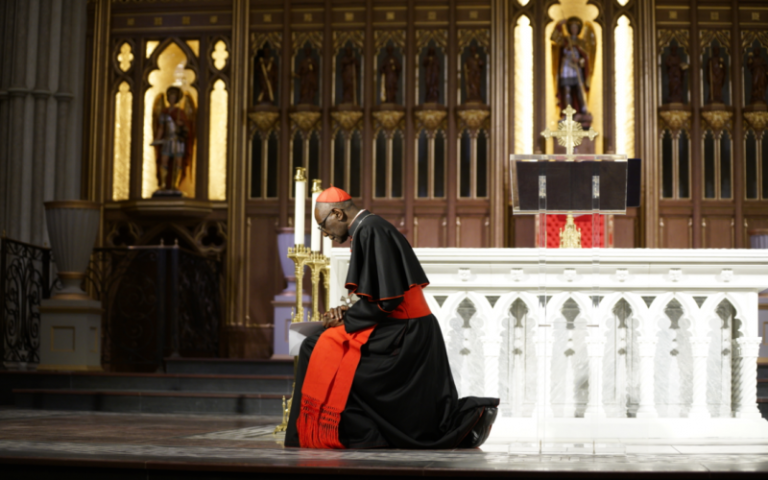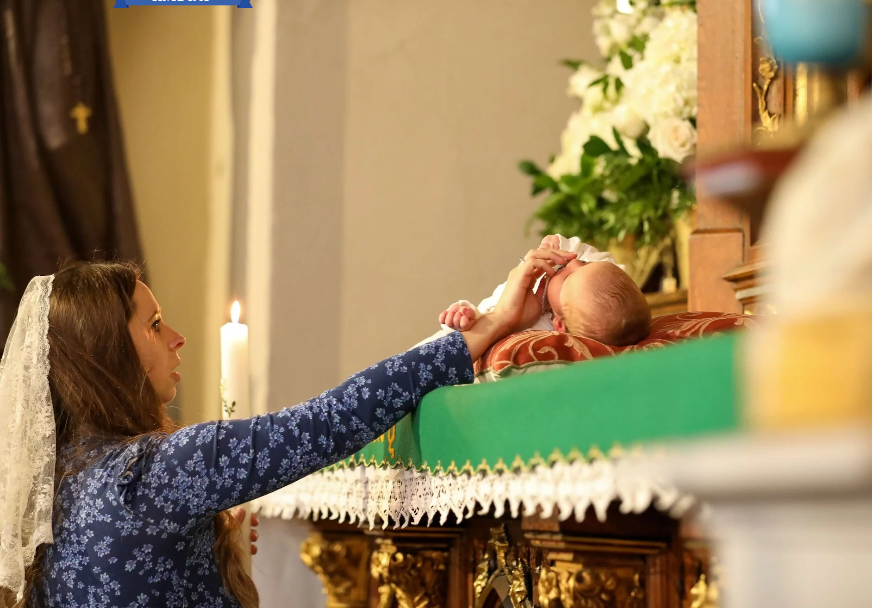The Vatican’s most senior cleric says we must fight against ‘the dictatorship of noise’
A few hours before Cardinal Robert Sarah delivers his public lecture at St Michael’s Cathedral Basilica in Toronto, I meet him for an interview at the nearby rectory.
Holding a plain wooden rosary in both of his hands, the cardinal sits a few feet from me. To my immediate left, a framed copy of Holbein’s portrait of Thomas More hangs on the wall. Between the setting and his meditative answers to my questions, I feel more like a retreatent than a reporter. The recent media controversies surrounding him seem far away as we discuss aspects of the
Christian life.
Soft-spoken and often repeating phrases for emphasis, the Vatican prefect for the Congregation for Divine Worship is completely comfortable taking long pauses to carefully form his answers. Nevertheless, he speaks directly and with conviction, matching the tone of his writing. Throughout the course of our conversation, I notice how expressive his eyes are. They are often the first to speak. Possessing a gentle intensity, he has a face that photos don’t fully capture.
As we cover topics ranging from his visit to Toronto to the role of Africa in the Universal Church, he often moves through a few beads of his rosary. His comments are variations of one central theme: friendship with God.
In The Power of Silence, Cardinal Sarah writes at length about his affection for the rosary. He describes it as the “silent” and “mysteriously effective hidden instrument” that has had “the last word” over the evils of the 20th century and “obtained the unthinkable” throughout history. Talking to him is not unlike following the narratives and rhythms of the rosary: as with its mysteries he ponders how the events of Christ’s life transform our sense of history, identity and purpose.
We start by discussing his itinerary in Canada. In addition to meeting faculty, staff and students at the University of St Michael’s College, he is also visiting with priests of the Archdiocese of Toronto and the students of St Augustine’s Seminary. Regarding his time with priests and seminarians, he says that he wants to “share his experience as a seminarian, priest, and bishop”. He then immediately turns to reflecting on the heart of the priest’s identity: “Priests must try to be like Christ.
It’s said that the priest is alter Christus, another Christ, but indeed, indeed, the priest is ipse Christus … Christ in himself.” In favouring the pronoun intensifier ipse, Cardinal Sarah highlights the self-sacrificial element of the priesthood.
Then his comments become more pastorally focused, more practical. He says he wants to tell priests and seminarians to take heart in their prayer lives. “It’s a long way to imitate, to be a friend of, Christ,” he says. He proceeds to describe the steps of this “long way”.
“I [must] have time to talk with [Christ],” he says, “to stay with Him, to adore Him, to listen to Him, and to learn from Him.
“It’s a long process,” he reiterates.
“I know that today a priest must be highly educated, to face many challenges. But the main thing he is asked to have is holiness. Holiness. Friendship with God.”
He then promises to pray for the priests and seminarians of Toronto. In particular, he says he hopes that all of them have what he calls, in French, the three S’s, Sainteté, Santé et Science. Smiling, he offers me an alliterative translation. “In English,” he says “it could be Holiness, Head knowledge and Health.”
He especially stresses his wish that all seminarians have the gift of health. In one of the few biographical details he offers, and the only one which comes unprompted, he makes brief mention of the fact that as a young seminarian his “health wasn’t very good.” This is an understatement. During his first year at St Augustine’s Minor Seminary in Bingerville, in the Ivory Coast, aged 11, he fell gravely ill. The sickness intensified, and for a time he wasn’t allowed to begin the second year of seminary. This illness was an early part of the “long way” of suffering characterising his seminarian formation, early years as a priest and especially his time as Archbishop of Conakry, in his home country of Guinea, during Sékou Touré’s Marxist dictatorship.
I mention the suffering he and the Church endured under Touré’s rule, and he nods, saying: “Yes. Yes. Exactly. That’s right.”
He offers no further comment but a few rosary beads move.
I press on with this theme, pointing out that both he and the Pope Emeritus, Benedict XVI, have used the term “dictatorship” to describe more than totalitarian politics. For Benedict, famously, the pervasiveness of relativism in the West is a dictatorship; for Cardinal Sarah, the ubiquitous noise which distracts us from hearing God falls into that category as well. How, I ask, can we – especially young people – resist?
Cardinal Sarah first addresses “the dictatorship of noise”. To put aside “the noise we are facing today,” he says “we must learn how to be silent.” This lesson, he notes, “only God can teach … because God is silent. So if I kneel before God, I just admire God, I just contemplate Him.”
Listening to his lecture in the cathedral later on that evening, my understanding of this comment changes. Initially, I took being silent to mean an active effort to become recollected in order to pray better. This remains a key practical aspect of the larger theology of silence Cardinal Sarah teaches. However, it goes much deeper than this.
Towards the end of his lecture, Cardinal Sarah notes that God is not only silent; God is silence. Entering into the depths of our hearts, then, is not actually a self-focused act. Instead, it is a re-direction of our gaze towards God, who made us in His image and dwells in us. This indwelling of God in our hearts, he said, is what constitutes our unchanging identity, what “ought to shape who we are”.
Identity, he reminded us, comes from the Latin idem, meaning “the same”. “Our deepest identity is that which remains constant in us, and what makes us the same person, day after day”. Silence, then, is the core of our identity, a core that transcends material, or what the cardinal repeatedly called “ephemeral” forms of self-identification (like the pursuits of pleasure or profit). It is this silent, constant presence of God in our hearts that is the unchanging ground of our identity, and shows us how to understand ourselves.
The cardinal’s lecture also opened up for me aspects of our discussion on the “dictatorship of relativism”. During our interview, he followed his comments about the “dictatorship of noise” with a reflection on morality as “not a burden” but the “way of loving God”. The growing promotion of individual “opinion, even in religion, even in doctrine, even in moral teaching” is rooted, he says, in a rejection of the abiding, unchanging moral law found in our hearts, where God silently dwells.
The most tragic result of relativism, Cardinal Sarah tells me, is a rejection of friendship with God. “Christ said: ‘If you are my friend, if you love me, then you have to respect my commandments.’ So love and friendship are linked. If I am a friend of God, I will respect His teaching … So love and law are very linked. Friendship and law are very linked.” He particularly stresses that priests and bishops in their teaching are called to conform to this truth. Otherwise, they are “confusing the people of God,” he says.
Towards the end of our interview, there’s a striking turn in our conversation. So far, the cardinal’s comments about seminarian education, priestly formation, and forms of political or cultural dictatorships apply generally to the Universal Church. However, his accounts of the family culture, warmth and tough realism of the people in his village in Ourous, one of Guinea’s smallest villages, are among the most affecting in his book God or Nothing. So I ask him what Africa has to offer the Church Universal.
“God,” he says, “was so kind” as to “involve Africa in the salvation of the world”. His answer focuses on the dramatic role Africa played throughout salvation history. “You know, in the beginning, when Christ was born, and was to be killed by Herod, Africa received Christ, and saved Christ. And in the end of His life, it is an African who helped Jesus to bring His cross: Simon of Cyrene. So, what is nothing God will use to serve the world.”
He then says that in our current historical moment, Africa offers a counter-cultural love of life and family in the face of dominant preoccupations with materialism and individualism. His passion is evident, but he continues to speak slowly and deliberately. “Africa must give what it has as treasure. It has faith, a link to God. It has family [and] its great value, children, all a gift of God. So we must maintain these values … It could seem nothing. But faith is great. Faith is a great treasure. So we offer that.”
He looks back at me, and smiles. “Because first we received faith from you, from Europe, so it is good to share with Europe today [these] riches … [these] treasures from Africa.”
A gracious thank you, a promise to pray for me, and he leaves. I pick up my own rosary, which Cardinal Sarah blessed for me before our interview began. Although rather simple as far as rosaries go, it is, comparatively speaking, far more decorative than the beads the cardinal held. My rosary also looks far less used…
Rebekah Lamb is a Gilson Post-Doctoral Fellow at the University of St Michael’s College in the University of Toronto
This article first appeared in the April 6th 2018 issue of the Catholic Herald. To read the magazine in full, from anywhere in the world, go here
http://www.catholicherald.co.uk/issues/april-6th-2018/the-long-way-of-cardinal-sarah/







